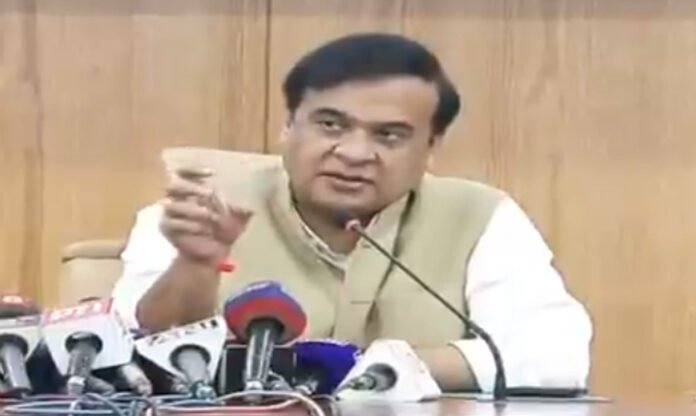In a move described as a milestone in social reform, the Assam Assembly has passed a bill that repeals the decades-old Assam Muslim Marriage and Divorce Registration Act of 1935. This legislative action marks a significant shift in the state’s approach to regulating marriage and divorce among Muslims, signaling the government’s intent to standardize these processes under a single, secular framework.
Chief Minister Himanta Biswa Sarma’s Vision for Assam
Chief Minister Himanta Biswa Sarma hailed the passage of the bill as a “historic day” for Assam, emphasizing that the repeal is a crucial step toward the eradication of child marriage and the establishment of a more uniform legal structure for marriage registration in the state. The Chief Minister’s remarks underscore the broader objectives of the bill, which seeks not only to end the practice of child marriage but also to dismantle the traditional Kazi system—a system that has long been responsible for the registration of Muslim marriages and divorces in Assam.
Sarma further elaborated on his vision for the future, stating, “Our next goal is to ban polygamy.” This statement highlights the government’s broader agenda of enforcing a uniform civil code that aligns with modern legal standards and promotes gender equality. The Assam government’s approach has sparked a significant debate, reflecting the complex interplay between religious practices and the state’s legislative authority.
Repeal Bill 2024: A Closer Look at the Legislation
The Assam Repeal Bill 2024, introduced by Revenue and Disaster Management Minister Jogen Mohan, aims to dismantle the Assam Muslim Marriage and Divorce Registration Act of 1935. This act, a remnant of British colonial rule, provided a framework for the registration of Muslim marriages and divorces by Kazis—a role deeply rooted in religious and cultural traditions. However, the government has argued that the act is outdated and incompatible with contemporary legal standards.
The bill’s proponents have highlighted several critical issues with the old law. One of the most significant concerns is the potential for underage marriages, given that the act allowed for the registration of marriages where the male was under 21 years of age and the female under 18. The lack of robust monitoring mechanisms under the old act also contributed to widespread non-compliance, resulting in numerous cases of child marriage that eventually found their way to the courts.
The Shift Towards Government-Controlled Marriage Registration
The repeal of the 1935 act represents a shift from a decentralized, community-based registration system to one that is entirely controlled by the state government. The Assam Compulsory Muslim Marriage and Divorce Registration Bill 2024, which has replaced the old law, mandates that all Muslim marriages and divorces must now be registered with the government. This move is intended to ensure greater oversight and to prevent abuses that were possible under the previous system.
The government has cited a 2006 Supreme Court ruling that mandates the compulsory registration of all marriages, regardless of religion, as a key justification for this legislative change. By bringing the registration of Muslim marriages and divorces under the purview of the government, Assam is aligning itself with national legal standards and ensuring that all marriages within the state are subject to the same rules and regulations.
Opposition and Criticism: A Divisive Decision
Despite the government’s strong defense of the bill, opposition parties and critics have condemned the move as discriminatory and politically motivated. They argue that the repeal targets the Muslim community specifically and could exacerbate communal tensions, especially in an election year. Opposition leaders have accused the government of using the legislation as a tool to polarize voters along religious lines, a charge that the government has denied.
Critics also contend that the abolition of the Kazi system undermines a long-standing religious institution that has played a central role in the social and cultural life of Assam’s Muslim community. By transferring the responsibility for marriage registration from Kazis to government officials, the state is effectively sidelining a tradition that many Muslims consider integral to their religious identity.
Assam Government’s Justification: Protecting Vulnerable Groups
In response to these criticisms, the Assam government has argued that the repeal is necessary to protect vulnerable groups, particularly young girls, from the harms of child marriage. Revenue and Disaster Management Minister Jogen Mohan has pointed out that the old law left significant gaps in enforcement, which allowed underage marriages to continue unchecked in many parts of the state. By requiring all marriages to be registered with the government, the new bill aims to close these loopholes and ensure that the legal age of marriage—18 for women and 21 for men—is strictly enforced.
Mohan also highlighted the informal nature of the previous registration system, which he argued was susceptible to manipulation and abuse. The lack of a formal, state-controlled registration process meant that many marriages and divorces were not properly recorded, leading to disputes and legal challenges that could have been avoided with better oversight. The new bill addresses these issues by creating a more robust and transparent registration mechanism, which the government believes will lead to better outcomes for all citizens.
The Path Forward: Implications for Assam’s Social Landscape
The passage of the Assam Repeal Bill 2024 is likely to have far-reaching implications for the state’s social landscape. By nullifying the 1935 act and bringing the registration of Muslim marriages and divorces under government control, the Assam government is setting a precedent that could influence future legislative efforts across India. The move also reflects a broader trend toward the secularization of marriage laws, as states seek to create uniform legal frameworks that apply to all citizens, regardless of religion.
For the Muslim community in Assam, the repeal represents a significant change in the way marriages and divorces are regulated. While some may view the move as an infringement on religious freedoms, others may welcome the increased legal protections that come with a state-controlled registration system. The ultimate impact of the legislation will depend on how it is implemented and enforced in the coming years.
Conclusion: A Bold Step Toward Reform
The repeal of the Assam Muslim Marriage and Divorce Registration Act of 1935 marks a pivotal moment in the state’s efforts to reform its marriage laws. By passing the Assam Repeal Bill 2024, the government has taken a bold step toward creating a more standardized and equitable legal framework for all citizens. While the move has been met with criticism from some quarters, the government remains steadfast in its commitment to protecting vulnerable groups and ensuring that all marriages in Assam are conducted in accordance with the law.
As Assam moves forward with the implementation of the new bill, the eyes of the nation will be on the state, watching to see how this legislative experiment unfolds. The outcome could have significant implications not only for Assam but for the future of marriage law reform in India as a whole.
















